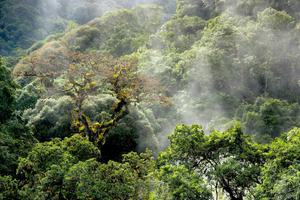Yasuní National Park in Ecuador. Andreas Kay via Flickr
After Ecuadorians overwhelmingly voted to end oil drilling in a prized national park, the government challenged the legitimacy of the referendum and said it would continue drilling.
On Sunday, nearly 60 percent of voters approved halting oil drilling in Yasuní National Park, which sits on the eastern edge of the Amazon rainforest and is home to two isolated tribes. The park is a hotspot for wildlife, with 121 reptile species, 139 amphibian species, and 610 bird species. The vote was hailed as a historic victory for forest protection.
The results were contentious, however, as oil is a major source of revenue in Ecuador, accounting for roughly a third of all exports. On Wednesday, Ecuador’s energy minister, Fernando Santos Alvite, said the government would not abide by the referendum, arguing that, per the constitution, only those living in the region can weigh in on oil drilling. In the province of Orellana, where Yasuní National Park lies, 58 percent of voters opted against the ban.
Activists are calling on the government to respect the results of the national referendum, which was ordered by the high court of Ecuador. They are also bracing for the final round of a presidential election that has been marred by political violence. Activists are urging the two remaining presidential candidates to abide by the drilling referendum, if elected. The candidates will face off in October.
A spokesperson for Yasunidos, the group that pushed for the referendum, told SciDev, “The experience in Ecuador shows us that we not only have to win the results at the polls, but then we must defend them.”



